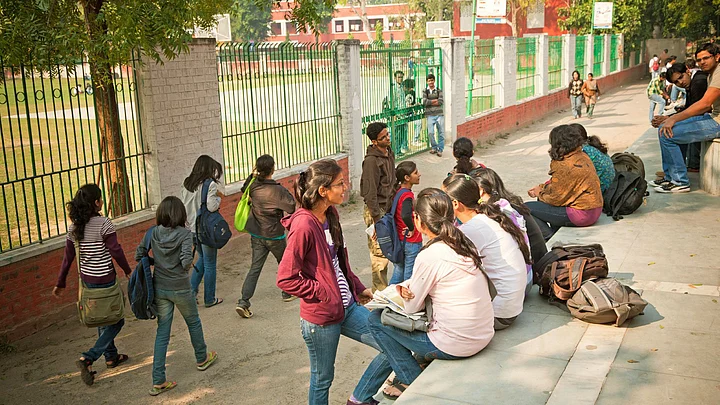With the admission process in Delhi University underway, a fresh controversy over "drastic" changes in the eligibility criteria has hit the varsity.
Students as well as members of the university's academic council (AC) and executive council (EC) have protested against these changes, with the latter having written to Vice Chancellor (V-C) Yogesh Tyagi calling the changes "arbitrary, unwarranted and uncalled for" and demanding a reversal to the earlier criteria.
The letter lists seven changes in the eligibility criteria as “major deviations”.
The one which has attracted the maximum outrage is for admission to BA (Hons) Economics, wherein Mathematics has been made compulsory to be included in the best of four subjects.
"Delhi University has witnessed unprecedented delay in the starting of the admissions process. Besides this, the whole process has been plagued by the arbitrary decision of the university administration (to change the eligibility criteria), which has caused massive tension amongst the applicants,” Rajesh Jha, EC member and one of the signatories to the letter, told The Quint.
“This is happening because the V-C is bypassing the statutory bodies, flouting all rules and regulations," he added
What Are the Changes?
Apart from making Mathematics compulsory in the best of four for admission to Economics (Hons), changes have also been made in the eligibility criteria of courses such as BCom (Hons), BSc (Hons) and BA (Programme).
For instance, for BCom (Hons), a student has to secure minimum 50 percent in Mathematics/Business Mathematics, as well as an aggregate of 60 percent with a “number of new conditionalities attached”, the letter pointed out.
In the previous year's eligibility criteria, one needed to only pass in Mathematics/Business Mathematics and secure an aggregate of 45 percent in the qualifying examinations.
Meanwhile, for BA (Programme), an aggregate of 50 percent or more is now required in the qualifying examinations, which is a 10 percentage point increase over the eligibility criteria for 2018-19.
'SC, ST, OBC and EWS Candidates to Be Impacted the Most'
The five signatories to the letter to the V-C point out that such policy decisions would have "far reaching adverse consequences” for poor and marginalised students.
“... The biggest impact would be on SC, ST, OBC and EWS candidates. Even in the last two years, after this V-C assumed charge, they were not able to fill up the seats for SC, ST, OBC – 6,000-7,000 seats were left vacant. The V-C is doing this on purpose.”Sudhanshu Kumar, DU Academic Council member, to The Quint
Jha concurs with Kumar, claiming students coming from the poor and marginalised sections may not be able to score as high as the students coming from the more privileged sections.
Both Jha and Kumar also allege that the academic council was not taken on board for the change in the eligibility criteria.
"The sanctity of the Academic and Executive councils should have been maintained and any change should have been affected only after debate and discussion," Kumar remarked.
Matter in Court
With the change in the criteria sparking off a controversy, the matter has now come before the Delhi High Court. The court on Wednesday, 12 June, sought the response of the Centre and Delhi University on two separate pleas challenging its new admission criteria for undergraduate courses.
The petitions claimed that the changes in the eligibility criteria in two of the courses – BCom (Hons) and BA (Hons) in Economics – is illegal and violates Article 14 of the Constitution as it was done arbitrarily, without any prior notice.
While one of the petitions came up for hearing before a bench of Justices Anu Malhotra and Talwant Singh, the other was heard by single judge, Justice Malhotra.
The matter has been fixed for further hearing on 14 June, when another similar petition is also listed.
(With inputs from PTI.)
(At The Quint, we question everything. Play an active role in shaping our journalism by becoming a member today.)
